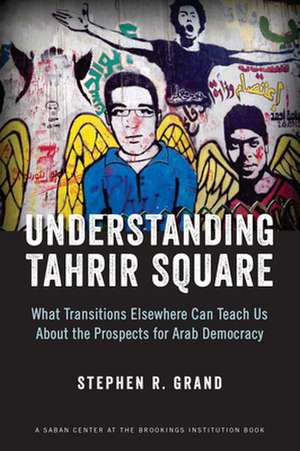Understanding Tahrir Square: What Transitions Elsewhere Can Teach Us about the Prospects for Arab Democracy
Autor Stephen R. Granden Limba Engleză Paperback – 10 apr 2014
Amid the current turmoil in the Middle East, Understanding Tahrir Square sounds a rare optimistic note. Surveying countries in other parts of the world during their transitions to democracy, author Stephen Grand argues that the long-term prospects in many parts of the Arab world are actually quite positive. If the current polarization and political violence in the region can be overcome, democracy will eventually take root. The key to this change will likely be ordinary citizens—foremost among them the young protestors of the Arab Spring who have filled the region's public spaces—most famously, Egypt's Tahrir Square.
The book puts the Arab Spring in comparative perspective. It reveals how globalization and other changes are upending the expectations of citizens everywhere about the relationship between citizen and state. Separate chapters examine the experiences of countries in the former Eastern bloc, in the Muslim-majority states of Asia, in Latin America, and in Sub-Saharan Africa during the recent Third Wave of democratization. What these cases show is that, at the end of the day, democracy requires democrats.
Many complex factors go into making a democracy successful, such as the caliber of its political leaders, the quality of its constitution, and the design of its political institutions. But unless there is clear public demand for new institutions to function as intended, political leaders are unlikely to abide by the limits those institutions impose. If American policymakers want to support the brave activists struggling to bring democracy to the Arab world, helping them cultivate an effective political constituency for democracy—in essence, growing the Tahrir Square base—should be the lodestar of U.S. assistance.
The book puts the Arab Spring in comparative perspective. It reveals how globalization and other changes are upending the expectations of citizens everywhere about the relationship between citizen and state. Separate chapters examine the experiences of countries in the former Eastern bloc, in the Muslim-majority states of Asia, in Latin America, and in Sub-Saharan Africa during the recent Third Wave of democratization. What these cases show is that, at the end of the day, democracy requires democrats.
Many complex factors go into making a democracy successful, such as the caliber of its political leaders, the quality of its constitution, and the design of its political institutions. But unless there is clear public demand for new institutions to function as intended, political leaders are unlikely to abide by the limits those institutions impose. If American policymakers want to support the brave activists struggling to bring democracy to the Arab world, helping them cultivate an effective political constituency for democracy—in essence, growing the Tahrir Square base—should be the lodestar of U.S. assistance.
Preț: 304.14 lei
Nou
Puncte Express: 456
Preț estimativ în valută:
58.20€ • 60.54$ • 48.05£
58.20€ • 60.54$ • 48.05£
Carte tipărită la comandă
Livrare economică 15-29 aprilie
Preluare comenzi: 021 569.72.76
Specificații
ISBN-13: 9780815725169
ISBN-10: 0815725167
Pagini: 258
Ilustrații: black & white illustrations, maps, figures
Dimensiuni: 152 x 229 x 18 mm
Greutate: 0.39 kg
Editura: Brookings Institution Press
Colecția Brookings Institution Press
ISBN-10: 0815725167
Pagini: 258
Ilustrații: black & white illustrations, maps, figures
Dimensiuni: 152 x 229 x 18 mm
Greutate: 0.39 kg
Editura: Brookings Institution Press
Colecția Brookings Institution Press
Notă biografică
Stephen R. Grand is a nonresident senior fellow with the Project on U.S. Relations with the Islamic World (which he directed for six years), housed within the Saban Center for Middle East Policy, in the Foreign Policy program at the Brookings Institution. Before coming to Brookings, he was director of the Middle East Strategy Group at the Aspen Institute. He also has been a scholar-in-residence at American University in Washington, an international affairs fellow at the Council on Foreign Relations, a director of programs at the German Marshall Fund, and a professional staff member for the Senate Foreign Relations Committee.
Descriere
Amid the current turmoil in the Middle East, Understanding Tahrir Square sounds a rare optimistic note. Surveying countries in other parts of the world during their transitions to democracy, author Stephen Grand argues that the long-term prospects in many parts of the Arab world are actually quite positive. If the current polarization and political violence in the region can be overcome, democracy will eventually take root. The key to this change will likely be ordinary citizens—foremost among them the young protestors of the Arab Spring who have filled the region's public spaces—most famously, Egypt's Tahrir Square.
The book puts the Arab Spring in comparative perspective. It reveals how globalization and other changes are upending the expectations of citizens everywhere about the relationship between citizen and state. Separate chapters examine the experiences of countries in the former Eastern bloc, in the Muslim-majority states of Asia, in Latin America, and in Sub-Saharan Africa during the recent Third Wave of democratization. What these cases show is that, at the end of the day, democracy requires democrats.
Many complex factors go into making a democracy successful, such as the caliber of its political leaders, the quality of its constitution, and the design of its political institutions. But unless there is clear public demand for new institutions to function as intended, political leaders are unlikely to abide by the limits those institutions impose. If American policymakers want to support the brave activists struggling to bring democracy to the Arab world, helping them cultivate an effective political constituency for democracy—in essence, growing the Tahrir Square base—should be the lodestar of U.S. assistance.
The book puts the Arab Spring in comparative perspective. It reveals how globalization and other changes are upending the expectations of citizens everywhere about the relationship between citizen and state. Separate chapters examine the experiences of countries in the former Eastern bloc, in the Muslim-majority states of Asia, in Latin America, and in Sub-Saharan Africa during the recent Third Wave of democratization. What these cases show is that, at the end of the day, democracy requires democrats.
Many complex factors go into making a democracy successful, such as the caliber of its political leaders, the quality of its constitution, and the design of its political institutions. But unless there is clear public demand for new institutions to function as intended, political leaders are unlikely to abide by the limits those institutions impose. If American policymakers want to support the brave activists struggling to bring democracy to the Arab world, helping them cultivate an effective political constituency for democracy—in essence, growing the Tahrir Square base—should be the lodestar of U.S. assistance.








